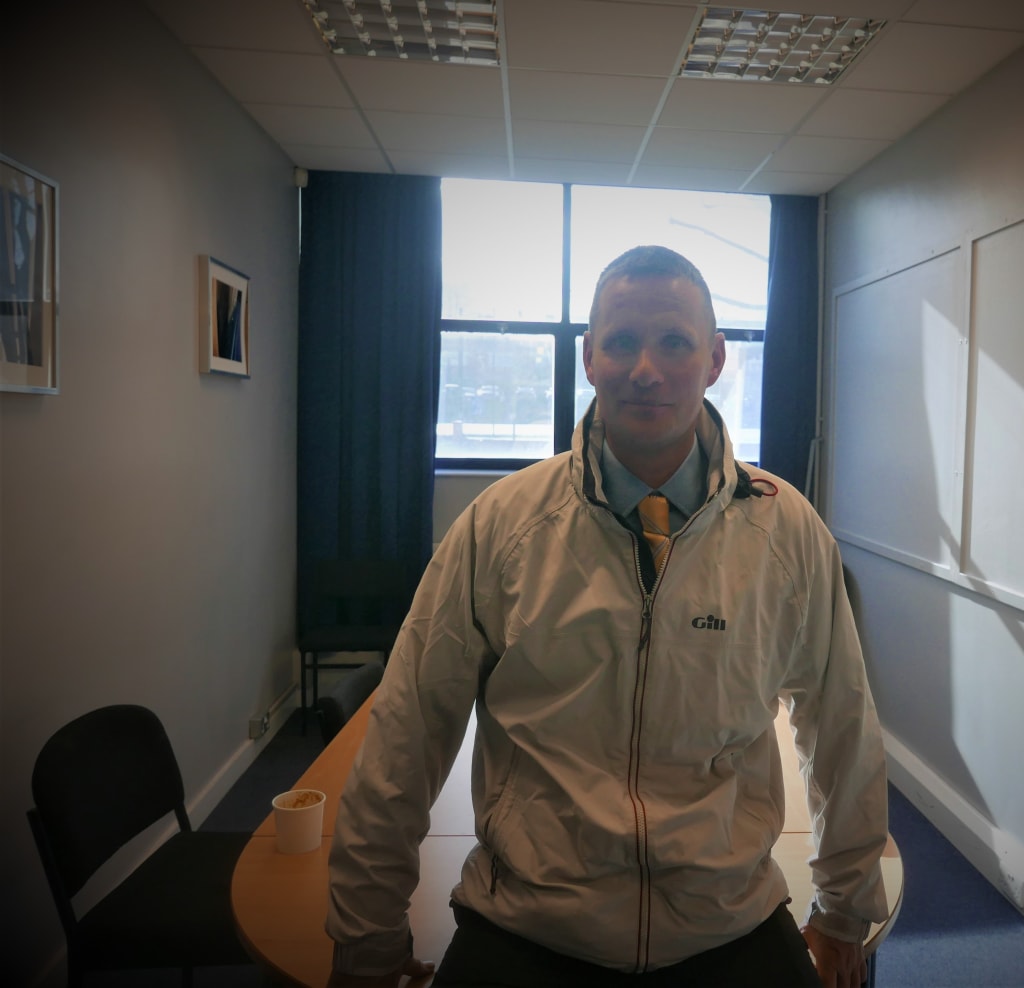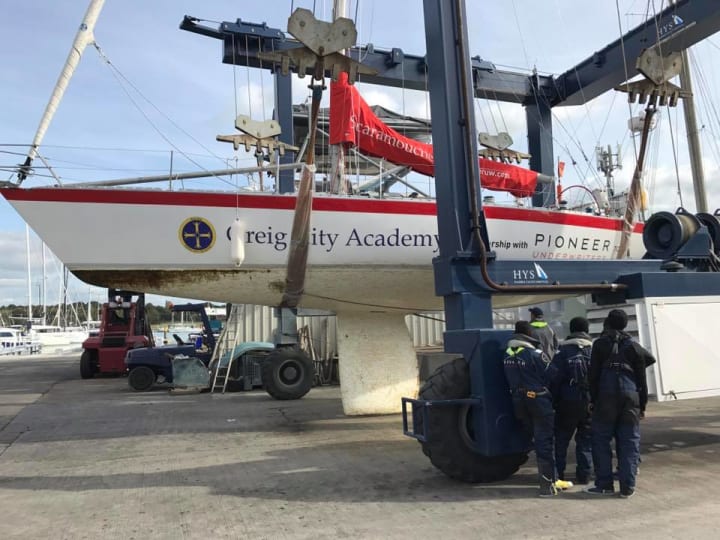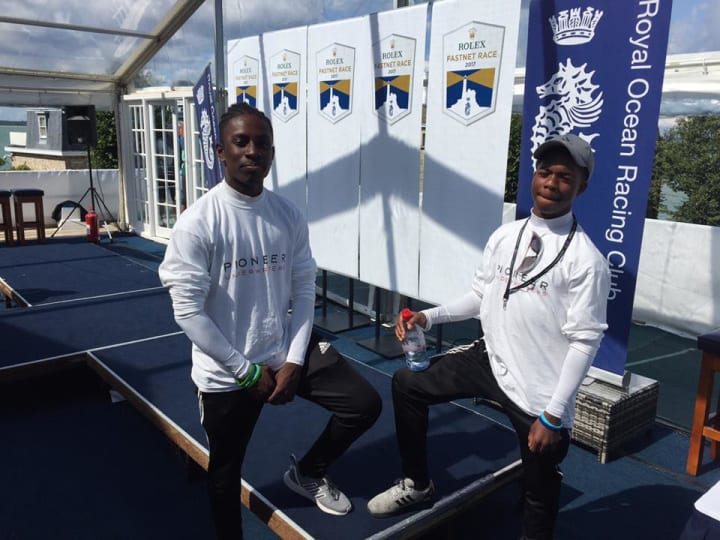
Chapter 1
A freezing wind bites through the morning air as Scaramouche, the forty-five-foot sailing yacht moves gently through the water as it manoeuvres out of the marina. On board is Mr Holt who stands tall in the middle of the boat, gazing out at the hundreds of pristine white sailing yachts surrounding him.
His boat is nowhere near as gorgeous or new or equipped as the ocean racers around him. Compared to the rest of the yachts, Scaramouche sits in the sea like a small sprout in a field of sunflowers.He observes the crew on the boat opposite them, designer sunglasses like hairbands on their sun-bleached hair as they polish their carbon fibre rigging. Their sponsored uniforms are immaculate and they are joking and laughing while sipping coffee from their flasks.
Mr Holt turns to his own crew, all teenagers between the age of fifteen and sixteen, all from the same deprived borough of North London and all blankly staring ahead in frozen fear.
Of the 1,533 boats taking part in the race today, Scaramouche is the only boat registered to an inner-city state school, and if they are successful, they will become the first state school to complete a competitive sailing race in European history. All they have to do is sail fifty miles around the Isle of Wight, and make it back to the starting point in one piece.
Montel Fagan-Jordan, the captain of the crew and cool cucumber of the team is feeling anxious behind the wheel. His nerves hadn’t allowed him a single wink of sleep the night before. Shabaaz, small in stature but big in character is looking up at the mainsheet ready to trim the sails once they started to speed up. Derek the class clown is standing next to the Halyard, he’s in charge of controlling the main sail. Making sure the running backstays don’t cause the mast to fall over is young Junior. He’s busy marvelling at his special uniform, it keeps him dry in case the cold water triggers his sickle cell disease and causes his body to shut down.
The BANG of the starting pistol echoes down the bay. The boys kick into gear and the air is suddenly full with the sound of ropes whizzing and feet scurrying along the deck. The sails begin to fill with the wind and as they gain speed the rushing waves thump the side of the hull, spurring on the crew like an accelerating drumbeat.
The boys are doing better than they imagined in this section of the race. They carve through the choppy sea, moving into pockets of open water, tactically manoeuvring to make sure their sails capitalise on the cleanest air and strongest gusts of wind. The cheering and chanting grows louder as they overtake professional sailors on million-pound boats.
“Come on Scaramouche! Come on Scaramouche!”
Even Mr Holt is joining in on the student’s football-hooligan like chant. As the hours go by the boys watch in amazement and ecstasy as they overtake hundreds of yachts.
But Mr Holt’s final cheer is reduced to a mere whisper as he spots The Needles.
The Needles are a row of 3 thirty-meter stacks that sit on the most westerly spot of the island. The beautiful geological rock formation attracts thousands of tourists every year due to its sheer size in the sea and pristine white body of chalk. For a sailor, The Needles are seen as more of a warning flag.
On the southern side of The Needles lies the unforgiving English Channel along with gale force winds and force eight sea conditions. The worst conditions Scaramouche has previously sailed in was a force six.
As the boat turns the corner on The Needles the crew become silent. No more chanting, no more banter. The race has now suddenly become about keeping safe and focusing on finishing. Mr Holt’s grip tightens around the railing as he watches the boats in front hug the shore of the island, all trying desperately to not get caught in the open sea.
The floorboards creak as the boat repeatedly drops from the crest of waves soaking its crew in bitter, salty seawater. The head-on wind accelerates the droplets of water and sprays across the exposed faces of the crew like pellets from a shotgun.
Scaramouche struggles to fight the waves as it weaves in between boats. Mr Holt’s instructions become sterner and more direct and Montel begins wrestling the wheel instead of steering it. They look ahead of them at the bright orange lifeboat attending to the unsubmerged half of an expensive looking racing yacht.
The adrenaline and fear of the situation is having differing effects on the pair. Mr Holt has put on a brave face, he’s panicking about keeping the kids safe. Montel on the other hand is using the adrenaline to push the limits of the boat, these are the strongest winds they have ever been out in and he wants to see how just how fast they can go.
After roughly five hours at sea Mr Holt spots a sailboat in front of them make a mistake. The sailboat is attempting to turn but it’s now caught in the head-on wind, leaving it still in the water with its sails flapping. He watches helplessly as the wind suddenly powers up the sails and launches the boat into the direction of Scaramouche.
The crew have seconds to react. Derek and Junior jump to the other side of the boat while Mr Holt kneels down in the cockpit. Montel grits his teeth as he attempts to steer the boat out of the way while shielding himself behind the wheel. They all stare in painful anticipation and brace for impact as the bow of the boat drops from the crest of the wave and onto the side of the Scaramouche.
Chapter 2
Mr Holt got his start sailing at the age of 15 taking his ‘wild duck boat’ out on the River Dee in the north of England. He spent five years building that boat in the family garage with his father, being lectured on how it was vital that a boat was safe, strong and stable in the water.
He was born and raised in the borough of Wirral, just outside Liverpool, an area not known for its sailing. Yet it was through sailing together every week that Jon and his father soon became best friends. Jon learned most of the basic foundations of life such as trust, dedication and respect while sitting on a small wooden boat in the murky Merseyside water with his father.
As a young teenager Mr Holt was able to transfer these life skills into his school work. He excelled in school and raced his way to the top of the class, soon establishing himself as a straight A student. It wasn’t long before his hard work paid off and he became the first person in his year group to be offered a place at Cambridge university.
There were a number of professions that Jon could have entered. However, it was his stern manner, attention to detail and bright intellect that he took from his father that pointed him towards a career in education. He decided he would complete a Post Graduate Certificate in Education (PGCE) in order to make the transition of Jon to Mr Holt. He found his passion and direction through sailing with his father, his intellect through his school years but it was during university where he found his calling.
Jon became a member of Homerton college at Cambridge university. Once a week he attended a three-course candlelit dinner known by the students as a ‘formal’. He felt stiff and awkward eating his meal in a graduation gown. The head of year often delivered speeches at dinner and the topic of conversation was often about how the establishment was determined to accept students from all kinds of backgrounds.
Jon joined at a time where many top universities had come under fire for not accepting students from state schools. Nowadays Cambridge university is proud to admit that the majority (68%) of their students are now state school educated, a figure that seems impressive until it is coupled with the fact that only 6% of the general population have graduated from private schools.
Week in week out he sat with his eyebrows furled and arms crossed staring down the long white table to see various senior members of the university rising from their chairs, clinking their glasses with silver spoons,
“…We treat all applicants at this university equally… we’ve lowered the entry requirements for disadvantaged students… I can’t understand why students from state schools aren’t applying to Oxbridge.”
This mindset infuriated Jon. It was nonsense, they didn’t understand the struggle that so many kids had to go through, the distractions, the insecurity and vulnerability that certain people are born into this unequal world with.
His tutors advised him to transfer to a private school, they argued that Jon would be able to spend more time actually teaching and enjoying his subject rather than having to discipline his students. Jon rubbished their advice and once again became the anomaly in his year group. He became the only student on his course to transfer to a non-fee-paying school.
In 2004 Mr Holt was interviewed to become the new geography teacher at Greig City Academy in Hornsey, North London. A school were over 73% of students were deemed disadvantaged and 62% considered English as an additional language. As he sat in the interviewing room he couldn’t help but observe the old run down caretaker’s home that was just outside the window. ‘Jeez’ he thought, ‘how much of a loser do you have to be to live in that thing.’
He got the job and almost immediately began an outdoor education programme. Mr Holt started out small. He bought cheap second-hand mountain bikes and took them cycling in the peak district, Snowdonia and Ireland. Whilst in Ireland, Mr Holt happened across a small marina offering dinghy sailing. He watched from the shore as he saw a young Montel’s face lighten up on the water. The students loved it. For weeks after they were telling stories about the time they’d spent sailing in Ireland. Mr Holt knew this couldn’t just be a one-time opportunity.
Mr Holt slowly got the students more and more involved in the outdoor education programme. He was known within the school as the strict and scary teacher, but it was the sporty and disadvantaged students who got to see the more compassionate side of him.
He began having to juggle his time with family commitments. His father had suffered a heart attack and was under strict instructions from his wife that he was to no longer go out on the boat without Jon. The weekends that Jon wasn’t spending with the students he was spending sailing the north of Wales with his father. They’d take the boat out for the day and Jon would ramble about his grand plan to get his students into a sailing programme.
As it turned out, the boys he used to yell at for coming into school late every morning because they were playing basketball, were brilliant sailors. They always turned up for training in half term and weekends because they didn’t have family holidays and extracurricular activities.
They were all sharp kids, they were sporty and they could all work hard when they wanted to. None of them realised it at the time but they were forming a chemistry that even the wealthiest of boat owners could never buy.
He had the crew but he didn’t have the boat. Money was still tight and he had already sold his house. Properties were expensive near the school and his partner was keen to live in London. The longer the house hunt went on the more appealing the caretakers home seemed, after all it was affordable and very convenient. They decided to move in.
Mr Holt spent weeks scrolling through the internet looking for a boat. Eventually, he found Scaramouche. It was a bargain, and for good reason, it hadn’t been in the water for almost four years. The boat sat glumly in a unkept field while weeds and wild grass slowly crept its way on board. It wasn’t pretty on the eye and the silver lining was that the fading paint job at least distracted from the various scrapes and cracks along the hull. The boat had a lot of potential but it would need a substantial amount of money thrown at it in order to make it fit for competitive racing.
But that was no problem for Mr Holt, he had bagged himself a Sainsburys credit card, £25,000 over seven years, game on. He placed a deposit and raced back to the school to deliver the good news to the rest of the crew.
Through various fundraiser talks and sponsorship deals Mr Holt and his students managed to get together £41,000. They bought the necessary gear and rigging to make the boat legal for competitions. They also bought new sails, filled in all the scrapes and cracks and upgraded all the necessary safety equipment. It even got a fancy new paint job with the school name and logo proudly displayed on the side of the hull.

After a few trips on the boat Mr holt decided they were ready to compete in The Round the Island race. The crew began intense preparation for the race and Mr Holt submitted their application. They would officially become a part of the most prestigious sailing race in the whole of Great Britain.
For six months they put a lot of work in and completed their health and safety certificates to make them eligible for race day. On the 30th of June they travelled down to the Isle of Wight and set up camp for the night.
Mr Holt woke them up at 4.50 am the next morning. Normally, he would blast out Sweet Caroline by Neil Diamond because he knew they hated his old music and it would get them out of bed. This morning however was different, a quick knock on the cabin door was all that was required.
Chapter III
As the boats collide the masts clash together ripping off Scaramouche’s radar and causing both boats to violently shake. The front sail of the colliding boat misses Montel’s head by inches and whizzes past the ear of the cameraman stood behind him.
Mr Holt frantically looks around grabbing the life vests of each student making sure everyone is safe. Everyone is okay. He checks around the boat to make sure there isn’t a leak and the boat isn’t sinking. It’s still intact.
They are exactly halfway through the race. They have to make a decision. Do they do what 300 other yachts have done and retire from the competition, or do they keep pushing forward with a damaged boat and attempt to make history as the first state school to ever complete the race.
Mr Holt keeps one eye on the sea and another on the mast as they meander around the island and towards the finish line. The sea is still rough but they battle through, slowly but surely, they make their way round the headland. With the end in sight, they cruise to the finish line with the wind on their backs.
Mr Holt can’t help but chuckle, they lost the radar, damaged the outboard engine, banged up the side of the hull and the mast was still shaking. But every single weary and exhausted face on that boat had a smile that made it all worth it. The crowd watched on as Montel, the youngest son of a carpenter and teaching assistant steered Scaramouche to the finish line.
Out of 1533 boats Scaramouche finished in 232nd place, 308 boats never made it to the finish line.
They had sacrificed too much to give up and retire. The hunger and desire to set an example was too high. To prove that it doesn’t matter where you’re from, or what you’ve been through, if you work hard, sacrifice enough and believe enough, you can achieve things people thought you never could.
The incredible success of the race proved to be just the beginning for the young crew, they returned to the school as heroes and went on to gain their GCSEs to progress into sixth form. Less than a year later they went on to compete in the Rolex Fastnet race, a five-day race from the Isle of Wight to the south of Ireland and back. They made history again as the first comprehensive school to complete the race.
Derek’s attendance at school went up from 40% to 98% since taking part in the Round the Island Race. He and Junior went on to gain places at University, something Mr Holt described as “An achievement that wasn’t even on the radar before sailing”. Montel decided to spend a gap year traveling the world with the Alex Thompson Racing team before joining Portsmouth University.
As well as going on to join one of the most prestigious and famous sailing teams in the world, Montel also won the young sailor of the year award in January of 2018. He is the first black man from an inner city to win the award.
Mr Holt remembers going to visit his father in Hospital after the boys had graduated. Unfortunately, his health had deteriorated, he was much frailer now. Although he still had enough energy to sit up in his hospital bed and track Montel’s travels on his iPad.
“Look Son! He’s just crossed The Equator”
“There he goes, they’ve just docked up in Antigua, they’ve been in the Caribbean a while now.”
“They did that trip fast, the Caribbean to Brazil… what a journey, not bad for a young lad from Tottenham.”
This was what made everything worthwhile for Jon. All the sacrifice and hard work, selling his home, running into debt, spending 105 days of the year practicing and training.
“It is a bit emotional when I look at Montel, seeing him stood in that pristine white sailing outfit and mixing with all those professionals. A part of you feels a bit sad because he’s moved on, and he’s moved so far. The goal is to give these kids a fighting chance and help them succeed in life, and we used sailing as the framework in order to do that”
Montel is currently looking to graduate with a first-class honour, his dream is to compete in a race around the world.

Mr Holt is now the head of Sixth form at Greig City Academy. He still lives with his wife and six-year-old daughter, Hannah, in the caretaker’s home. Project Scaramouche is now self sufficient and he and his wife hope to set up a help and advice scheme to get more students around the country involved in sailing.
Project Scaramouche still runs at the core of the school. They have a growing fleet of dinghies that they use for training purposes and are now beginning to send pupils to Portugal to be professionally trained by the Olympic sailing team. Between 160-200 students now take part in the outdoor education project with around 20 kids expected to follow in the footsteps of Montel.
In September 2019 Jon’s father unfortunately passed away due to a secondary infection. Mr Holt makes sure to visit his grave every time he goes back home. He remains in a small graveyard by the coast overlooking the boats in the open water, ‘Its exactly what he would have wanted’ says Jon, ‘I make sure to take a little porcelain boat up for him to sit among the flowers, I think I most hold some kind of record for the amount of these boats I’ve purchased online.’
Montel still helps to train the students currently involved in Project Scaramouche, ‘A lot of the students have now got really good facilities and support structures in order to really excel at sailing.’ A cheeky smile spreads across his face, ‘Some of them are even better than me, but I would never admit that to them.’






Comments
There are no comments for this story
Be the first to respond and start the conversation.